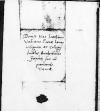Quod tanto tempore, humanissime Vadiane, nihil mihi scripseris, quamvis pollicitus sis id facere saepius, non aegre fero; nam tot et tanti superinscribed in place of crossed-out .⌈.ii superinscribed in place of crossed-out .⌉s apud ⌊tuam Pirrham⌋ te scio negotiis occupatum, quod etiam plus agas apud eam superinscribed⌈apud eamapud eam superinscribed⌉,
quam ⌊hic ms. s(!)
⌈cc ms. s(!)
⌉⌋, qui in apum meditatione consenuit. Si tamen aliquando feriatus fueris et vetustum cunnum pertaesus, quaeso sciam, quid agatur, cur hactenus nihil scripseris. Me nec ⌊Polixena⌋ nec ista vel similis ⌊⌊Hectoris⌋ matris⌋ detinet, quominus, dum opportunitas adest, tui obliviscar. Pro meo
igitur in te amore te plurimum rogo, promissis satage et me ex hoc solve dubio, ne videar ⌊Andromacha⌋ minor; tuus enim velim esse vel pathicus, sed vicissim; et dum poteris per otium ab ista tua inveterata resipiscere, scribe, u written over e⌈euu written over e⌉t sciam me tibi illa cariorem,
cf. Hor. Carm. 1.1.36 ⌊sublimi feriam vertice sideracf. Hor. Carm. 1.1.36 ⌋. Quod si forte excusatus esse volueris per tabellarios, quos habere nequis, noli esse
cf. Vulg. Ps (G) 115.11 Omnis homo mendax ⌊Davidicus mendaxcf. Vulg. Ps (G) 115.11 Omnis homo mendax ⌋, tabellae enim ⌊caesaris⌋ apud vos sunt, sedulo proinde da litteras. Ubi ⌊caesar⌋ est, ibidem cum ⌊domino reverendissimo Vladislaviensi⌋ futuri sumus. Interea vero tibi provinciam impono, ut ⌊Riccardo⌋, qui etiam mei oblitus est, et ⌊Ursino⌋, ⌊Collimitio⌋ tamen nostro imprimis, nomine meo salutem dicas, nec ⌊Rusticum⌋ nostrum praetereas. Vale et is sis, qui apud me esse voluisti.
 VSSG, Ms. 30, f. 58v
Doctissimo viro
VSSG, Ms. 30, f. 58v
Doctissimo viro 
